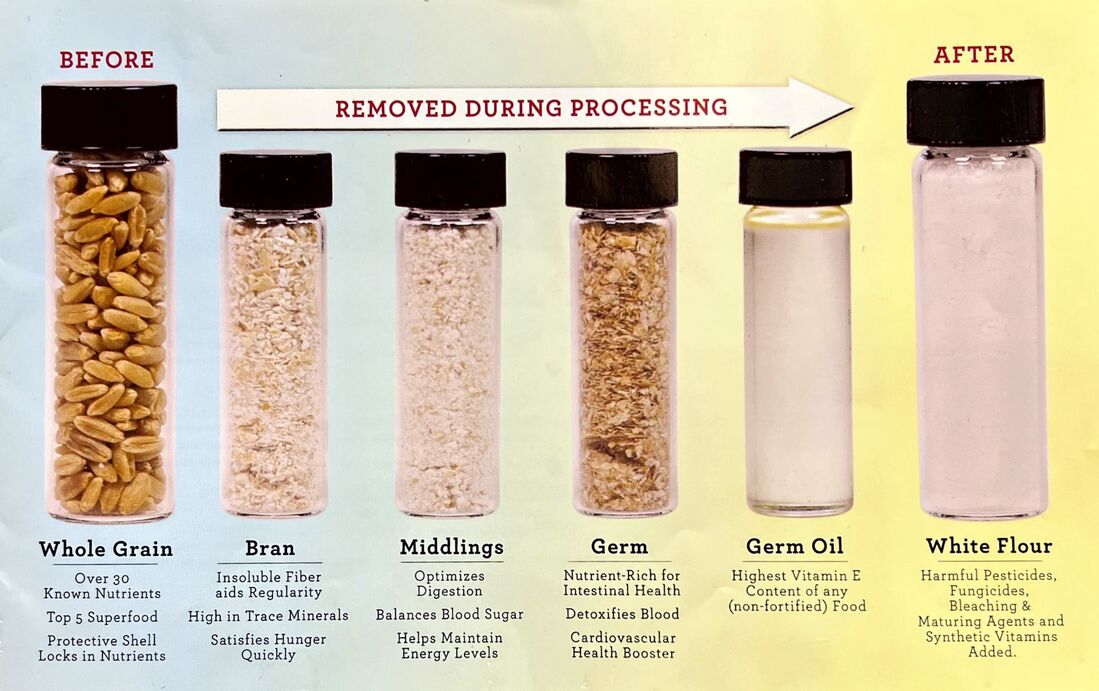All About The Grain....The Whole Grain
Whole grain wheat kernels are called berries. These berries consist of the bran, endosperm, and germ. As long as the
grain kernels remain intact and placed in sealed, dry storage, they can last for 10 years or more. Wheat ranks first among the grains for its nutritional value. It contains over 30 nutrients. Furthermore, of the many essential nutrients needed by the body to promote good health, there are only four nutrients deficient in wheat: vitamin A, vitamin C, vitamin D and the amino acid lysine. Wheat is an excellent source of fiber and many critical B-vitamins when using the entire kernel: the bran, germ, and endosperm. Wheat germ is one of the richest sources of vitamin E if used when freshly milled, before oxidation takes place. However, within 3 days of milling grain, 95% the nutrients in the resulting flour are lost to oxidation. That is why it is best to freshly mill grains into flour when ready to bake. Processed flour sold in the store, however, is not a good source of nutrients, even flour labeled whole wheat. The bran, germ, and germ oils have been removed during processing, and the endosperm containing the protein and starch is all that remains. This endosperm is then chemically treated and fortified with 5 synthetic vitamins. Whole wheat flour is still processed in the same way but only has some of the bran added back in. When people have problems digesting wheat, it is more often due to the processing of the flour rather than a gluten problem with the wheat. Many people who have issues with processed flour can eat freshly milled grain flour products with no problems.
Learn more at a wheat milling sourdough bread making workshops
East Phoenix Valley
For those interested in incorporating whole grain practices at home using freshly milled flour, Jodi Huerter offers milling workshops once a month. She demonstrates how to mill whole grains into flour to make bread and other foods. These foods not only are more nutritious, but they are more flavorful, too! The cost for the workshop is $20, which covers a milling booklet containing all the information to get started and freshly milled food samples. Contact her at jodi.huerter@gmail.com for more information and to get signed up for the next workshop.
Verde Valley - Sedona Workshop
Sourdough bread baking workshops, gluten free bread making, cheese, yogurt, kefir cultures along with other fermented health foods. and several whole grain whole food workshops are available on Beth Ellen's current calendar events.
grain kernels remain intact and placed in sealed, dry storage, they can last for 10 years or more. Wheat ranks first among the grains for its nutritional value. It contains over 30 nutrients. Furthermore, of the many essential nutrients needed by the body to promote good health, there are only four nutrients deficient in wheat: vitamin A, vitamin C, vitamin D and the amino acid lysine. Wheat is an excellent source of fiber and many critical B-vitamins when using the entire kernel: the bran, germ, and endosperm. Wheat germ is one of the richest sources of vitamin E if used when freshly milled, before oxidation takes place. However, within 3 days of milling grain, 95% the nutrients in the resulting flour are lost to oxidation. That is why it is best to freshly mill grains into flour when ready to bake. Processed flour sold in the store, however, is not a good source of nutrients, even flour labeled whole wheat. The bran, germ, and germ oils have been removed during processing, and the endosperm containing the protein and starch is all that remains. This endosperm is then chemically treated and fortified with 5 synthetic vitamins. Whole wheat flour is still processed in the same way but only has some of the bran added back in. When people have problems digesting wheat, it is more often due to the processing of the flour rather than a gluten problem with the wheat. Many people who have issues with processed flour can eat freshly milled grain flour products with no problems.
Learn more at a wheat milling sourdough bread making workshops
East Phoenix Valley
For those interested in incorporating whole grain practices at home using freshly milled flour, Jodi Huerter offers milling workshops once a month. She demonstrates how to mill whole grains into flour to make bread and other foods. These foods not only are more nutritious, but they are more flavorful, too! The cost for the workshop is $20, which covers a milling booklet containing all the information to get started and freshly milled food samples. Contact her at jodi.huerter@gmail.com for more information and to get signed up for the next workshop.
Verde Valley - Sedona Workshop
Sourdough bread baking workshops, gluten free bread making, cheese, yogurt, kefir cultures along with other fermented health foods. and several whole grain whole food workshops are available on Beth Ellen's current calendar events.

